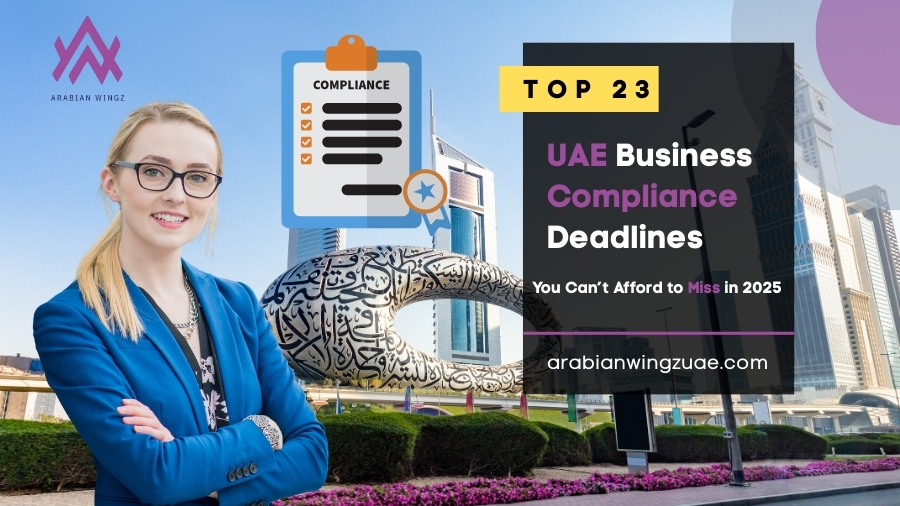- info@arabianwingzuae.com
- +971566621785
- Mon - Sat 9:00 AM - 6:00 PM

FTA announces Corporate Tax Registration Deadline – 90 days from Date of Incorporation/MOA. AED 10k penalty for late registration.

Doing business in the UAE comes with a range of exciting possibilities. However, it also involves significant financial and regulatory compliance deadlines. Failure to meet deadlines such as VAT return filings, corporate tax registrations, and license renewals may result in severe penalties and fines. Therefore, to assist business owners in staying aware and compliant, we have created a short guide of some of the key services and their essential UAE Business Compliance Deadlines you need to be aware of in 2025.

Compliance is important for business success in the ever-evolving market of the UAE. Being on time with deadlines helps to keep your company operating legally while also building trust and efficiency. Missing deadlines, such as VAT returns, corporate tax filings, or license renewals, can create monetary fines, penalties, or result in the suspension of company activities. If you want a non-stressful experience, reach out to professional business service providers specialized in UAE compliance, such as Arabian Wingz. They can help you keep on track and avoid penalties while growing your business in the best way possible.
1. What are the key compliance deadlines for UAE businesses in 2025?
Companies in the UAE are required to adhere to deadlines for VAT returns, corporate tax registration, trade license renewals, and other obligations. The key deadlines consist of submitting VAT returns quarterly, as well as renewing the trade license on an annual basis. Corporate tax returns must be submitted 9 months after the end of the corporate financial year. Apart from this, there are several other deadlines that need to be taken care of by businesses to avoid hefty fines or penalties.
2. When is the UAE corporate tax registration deadline in 2025?
The deadline to register for corporate tax in the UAE is 6 months after the end of the company’s first financial year. For a company with a financial year that ends on December 31, registration is due by June 30, 2025.
3. How often should businesses in Dubai renew their trade license?
Companies in Dubai must renew the trade license on an annual basis, and typically would prefer to renew before the expiration period, so that the company can continue to operate during business activities.
4. What is the VAT return filing deadline in the UAE?
VAT returns must be submitted quarterly. The deadlines for submission are determined on the 28th day of the month following each quarter’s end. For example, the VAT return for Q1 (January to March) would be due for filing on the 28th of April.
5. How long do companies have to file corporate tax returns in the UAE?
Corporate tax returns must be filed within 9 months after the end of the financial year. For example, if a business’s financial year ended on December 31, the company must file a corporate tax return by September 30 of the following calendar year.
6. Do Free Zone companies in the UAE have compliance deadlines?
Free Zone companies in the UAE also have deadlines to comply with for VAT returns, corporate tax registration (if applicable), trade license renewals, and economic substance reporting. Deadlines are based on the business activities, structure, and location of the company.
7. What penalties apply if a UAE business misses compliance deadlines?
If the business does not comply with deadlines, penalties can include fines, late fees, and potentially even suspension of the trade license. Fines can be from AED 1,000 to AED 50,000 depending on the violation.
8. What are the deadlines for company liquidation in Dubai?
If a company wishes to liquidate, it must follow a process whereby it notifies the relevant authorities, repays all debts, and submits the company’s documents. This can take a few months for the complete process to take place, and the deadlines for submission are dependent on the company’s legal status.
9. How often must an ICV certificate be renewed in the UAE?
The In-Country Value (ICV) certificate needs to be renewed annually. This certificate evidences that businesses contribute to the UAE economy through local expenditure and employment.
10. When should UAE companies apply for a Tax Residency Certificate?
Companies willing to apply for a Tax Residency Certificate will have to apply annually for this entitlement. This is relevant for tax benefits or mitigating double taxation; it should be submitted in advance of the next financial year preceding the commencement of the financial year.
11. What are the compliance requirements for AML in the UAE?
Companies in the UAE are required to follow Anti-Money Laundering (AML) legislation by having procedures in place to investigate transactions and report any suspicious activity. They also need to make sure their staff have AML training and have processes in place for record keeping.
12. How often should businesses update their KYC documents with UAE banks?
Businesses are responsible for renewing Know Your Customer (KYC) documents annually or whenever there is a change in the business ownership or structure, or in the key personnel. This relies on the bank to maintain all the latest information.
13. What is the renewal period for ISO certification in the UAE?
ISO certifications need to be renewed every 3 years. As part of the renewal process, the company must show that they have had audits performed and that it have improved.
14. When should UAE businesses conduct statutory audits?
Businesses in the UAE also must perform statutory audits on an annual basis. This is especially important for businesses with revenues over AED 250,000, in order to ensure financial transparency and compliance with regulations.
15. What are the key compliance deadlines for UAE Free Zone companies?
Free Zone companies must renew their trade license annually, submit VAT returns quarterly, and ensure that they meet local Free Zone compliance regulations by the specific due date.
16. How often should a UAE company renew its trademark registration?
A trademark in the UAE must be renewed every 10 years. It’s important to keep track of the renewal date to avoid losing trademark rights.
17. What are the deadlines for filing excise tax returns in the UAE?
Excise tax returns must be filed every quarter. The deadline for each quarter is the 15th day of the month after the quarter ends (e.g., for Q1, the deadline is April 15).
18. How long should UAE companies keep accounting and financial records?
UAE companies must retain their accounting and financial records for 5 years. These records include receipts, invoices, and financial statements for audits or inspections.
19. When should Golden Visas be renewed in the UAE?
The UAE Golden Visa must be renewed every 5 or 10 years, depending on the visa type. Ensure that the renewal application is submitted well before the expiry date.
20. What is the deadline for transfer pricing documentation in the UAE?
Companies must submit their transfer pricing documentation along with their annual corporate tax return. This must be filed within 9 months of the fiscal year-end.
21. How often should UAE companies conduct business valuations?
At a minimum, business valuations should occur every 3 years, or at the time of a financial event that impacts the company’s value, such as a merger, acquisition, or funding round.
22. What is the process and timeline for mergers and acquisitions compliance in the UAE?
There is a compliance process for mergers and acquisitions, which involves submitting required consents, finishing due diligence, and fulfilling any other regulatory obligations. The whole process could take several months.
23. How can UAE businesses avoid missing compliance deadlines in 2025?
To avoid missing deadlines, companies should set reminders, record and track all the important dates, while also discussing any updates with legal or tax professionals. Moreover, they can also partner with experts like Arabian Wingz, who will take care of the deadlines and make sure that the business stays compliant and ready to scale.
Read More: How to Register for VAT in Dubai, UAE: Step-by-Step Guide
Top Benefits of Accounting And Bookkeeping Services for Businesses in Dubai, UAE





